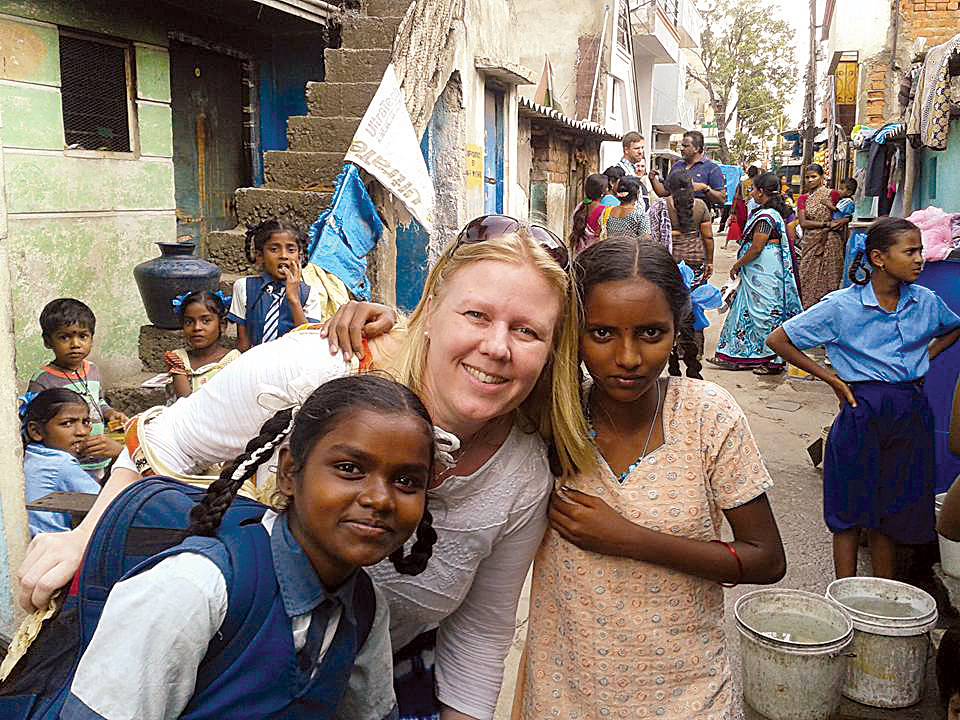Cultural Submersion Shapes Dr. Arrington's Life
By Tracy Balzer
June 29, 2018

Dr. Aminta Arrington’s life and ministry, filled with color and calling, have built a solid foundation for her academic research and her role as JBU’s assistant professor of intercultural studies. What brings that expertise to life are the eight years she lived and worked in China. Today Aminta spends her days passing that passion on to her intercultural studies students.
“It all started shortly after I graduated from college,” Aminta said. “I was visiting some college friends and we went to see ‘The Joy Luck Club,’ a movie about four mothers born in China and their Chinese-American daughters.”
The depiction of cultural tension between mothers and daughters sparked Aminta’s new fascination with Chinese culture.
Later, she and her husband Chris moved to Japan with the U.S. Army. In 2000, Aminta enrolled in Japanese classes at a university in Tokyo, where most of her classmates were Chinese. The friendships she built deepened Aminta’s interest in China, and in 2001, she traveled there for the first time.
During this time, Aminta confronted some significant spiritual challenges. Though she had been a Christian for many years, she kept her plans and dreams for life under her own control; she never submitted them fully to God.
“The result was a great spiritual struggle — about four years — until I finally stopped wrestling with God and fully gave over my entire life, all my hopes and dreams, all the plans I thought were so great, over to Him,” Aminta said.
One week later Chris came to her with a startling declaration. As he had stood watching their infant daughter, Katherine, sleep, a sudden thought came into his head, “We should adopt a baby sister for her from China.”
“When he told me, I felt electricity (the Holy Spirit), go up and down my spine,” Aminta recalled. “‘That’s exactly what we should do,’ I told him. And suddenly, it was as if the scales had been cleared from my eyes, and I saw that my entire life had been preparing me for this – for adoption, for China. Within a month we had started the adoption paperwork.”
The adoption of their daughter, Grace, made their connection to China permanent.
In 2006, as Chris was retiring from the Army, the opportunity came to serve in China long term. The Arringtons, now a family of five, with the addition of son Andrew, worked with an organization that placed Christian teachers in Chinese universities. Aminta taught English and international relations at two different universities with the goal of building relationships and testifying about her life in Christ.
The Arringtons placed all three of their children in local Chinese schools, taking seriously the responsibility to expose Grace to the richness of Chinese culture.
Aminta spent her eighth and final year in China researching the Lisu, one of China’s 55 ethnic minorities, for her doctoral dissertation. Today the majority of Lisu are Christians, having been evangelized by missionaries with Chinese Inland Missions (now Overseas Missionary Fellowship) in the 1820s.
Aminta immersed herself in the culture, living among the Lisu for several months. There, she learned what it meant to be a Lisu Christian and witnessed firsthand how Christianity makes its home in every culture.
“Conversion to Christianity does not require converting to a particular culture,” Aminta said. “It’s one of the things that sets Christianity apart from other world religions.”
Knowing the Lisu’s hospitality is intentionally directed to strangers, when Aminta arrived in the Lisu village she strategically sat in the church courtyard and waited. Not long after, a Lisu woman approached her.
“She asked me, ‘Have you eaten yet?’ and I said ‘No, I haven’t.’ She said, ‘Come on up, let’s have dinner before church.’ She invited me into her home. Can you imagine if a Lisu woman came and parked in one of our American church parking lots for a while? What would happen? Would she be invited into one of our homes? Probably not,” Aminta said.
Aminta recognized that the Lisu way of extended hospitality to the stranger, the widow and the orphan closely follows the model in scripture.
“God says that we should love the stranger,” Aminta said. “God says ‘I love the stranger in your midst.’”
Aminta also observed their very distinctive way of expressing Christian faith. The Lisu Christians attended church five times a week — Wednesday night, Saturday, and three times on Sunday — and put on Christian festivals three times a year, which include four days of eating, living and worshipping together.
Besides the Bible, the only other book the Lisu have in their language is a hymnal.
“If you are a Lisu Christian, you will sing,” Aminta said. “Singing translated hymns binds them together as a body of believers, and the hymns teach a lot of theology in simple, easy to remember phrases — so important for a primarily-oral people.”
While Aminta is polishing her research and seeking a publisher for the book, her focus is fixed on equipping JBU students to serve the world. But one day she hopes to return to the Lisu.
“China will be a part of our life forever, and God has not let me let go of the Lisu yet,” Aminta said. She continues to pass on the lessons the Lisu have taught her to her students.

